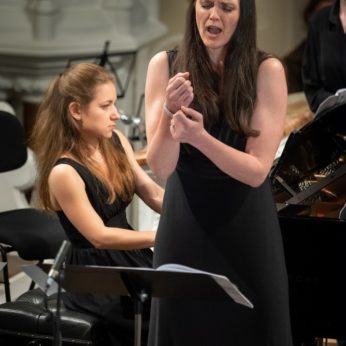Composer: Dmitri Shostakovich (b. 1906 - d. 1975)
Performance date: 02/07/2019
Venue: St. Brendan’s Church
Composition Year: 1967
Duration: 00:26:56
Recording Engineer: Gar Duffy, RTÉ
Instrumentation Category:Solo Voice
Instrumentation Other: s-solo, vn, vc, pf
Artists:
Caroline Melzer -
[soprano]
Delta Piano Trio (Gerard Spronk [violin], Irene Enzlin [cello], Vera Kooper [piano]) -
[piano trio]

Caroline Melzer [soprano]
Delta Piano Trio
Gerard Spronk [violin], Irene Enzlin [cello], Vera Kooper [piano]
Dmitri Shostakovich [1906–1975]
Seven Romances on verses by Alexander Blok [1967]
1. Ophelia’s Song [with cello]
2. Hamayun, the prophetic bird [with piano]
3. We were together [with violin]
4. The city sleeps [with cello and piano]
5. Storm [with violin and piano]
6. Mysterious signs [with cello and violin]
7. Music [with full trio]
Shostakovich suffered all his life from bad health. From 1958 he began to suffer from a debilitating nervous illness that turned out to be a form of polio; this seriously affected his ability to play the piano. He also had a heart condition. In May 1966 as part of his sixtieth birthday celebrations he nerved himself to accompany the bass Yevgeni Nesterenko for the premieres of his satirical song cycle Five Romances on texts from Krokodil Magazine and the delightfully ironic miniature Preface to the Complete Edition of My Works and a Brief Reflection apropos of This Preface. He had not performed in public for two years, so the combination of his nervousness and the stifling heat led to his first heart attack. While recovering from this in hospital, he chose the Alexander Blok texts for a commission Rostropovich had given him for some vocalises for himself and his wife Galina Vishnevskaya. But after he returned home, forbidden to smoke or to drink, he suffered a creative block for nearly a year and began to wonder if he had dried up.
Then one day his wife Irina went away for a few days and he started looking through the cupboards and lo and behold there on the bottom shelf was a half bottle of brandy. She had hidden all the drink in the house, but by chance I discovered this bottle. And you know, I had this sudden urge to drink, which I couldn’t resist, so I had a glass. And you know, it was so good that I sat down and everything came to me at once, and I finished the work in three days. One wonders what Irina made of the gaps in that narrative. In later years he used to say that a sure sign of an imminent heart attack was when he stopped enjoying his vodka.
Shostakovich told Rostropovich: Slava, you understand, you see, I wanted to satisfy your request – I found some suitable texts to set and I wrote the first song as you wanted for voice and cello. But then I started the second song with a whacking great pizzicato on the cello, and I realised that I didn’t have sufficient instruments to continue, so I added the violin and piano.
Alexander Blok was a great turn-of-the-century symbolist poet whom Akhmatova met and greatly admired, though she distrusted the demonic quality in his nature. But his poetry was hardly the sort of material that would be approved by the authorities. Shostakovich wrote the piano part for himself, taking into account his physical limitations. Unfortunately he broke his leg before the premiere and the composer-pianist Weinberg deputised for him in a stellar line-up, where Oistrakh joined Rostropovich and Vishnevskaya. There is a wonderful photograph of this performance.
Ophelia’s song is a quiet Lover’s Lament to the accompaniment of the solo cello. The text of Hamayun would never have got past the censor in Stalin’s time; to thunderous piano chords the singer hurls out her dreadful prophecy of dictatorship and executions, the power of the wicked, the death of the righteous – the final comments of the piano say everything. The third song is accompanied by the violin singing the haunting tune of love’s loss, the inextricable intertwining of music and love. The fourth song brings the first duo accompaniment, cello and piano, to that mystical moment when a whole city seems to be asleep and only the poet awake.
Each of the songs, you will have noticed, takes place at dusk or dawn or night, but for the last three interlinked songs the night is pitiless, and the poet-composer is clearly face to face with dreadful demons. After the raging storm in the fifth song, the singer turns to her dreams but can find no solace outside a fading book containing a golden braid, and she looks in horror at the approaching end. And so we reach the final overwhelming declaration of faith in the power of music. This last mystical and impassioned song puts music at the centre of the universe and, in words that Shostakovich clearly took desperately seriously, tells of the sacrifices that may have to be made. The ending is not an easy one.
Francis Humphrys
Copyright © 2025 West Cork Music. All rights reserved.
Designed and developed by Matrix Internet